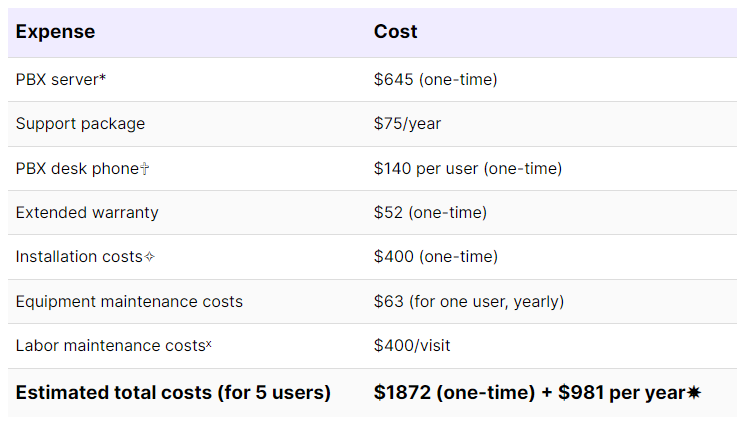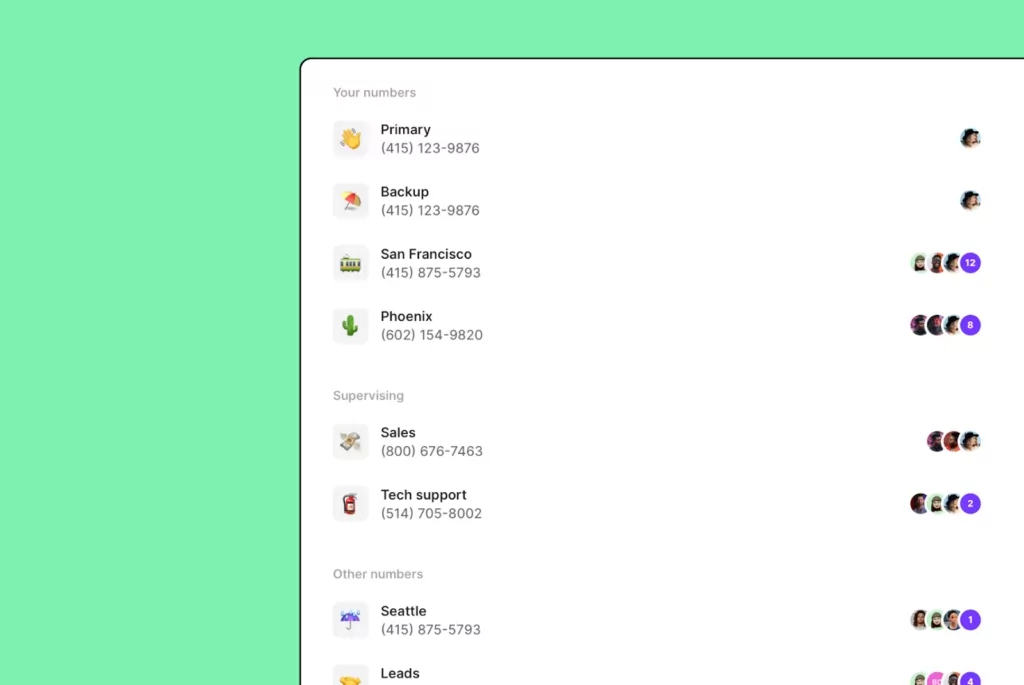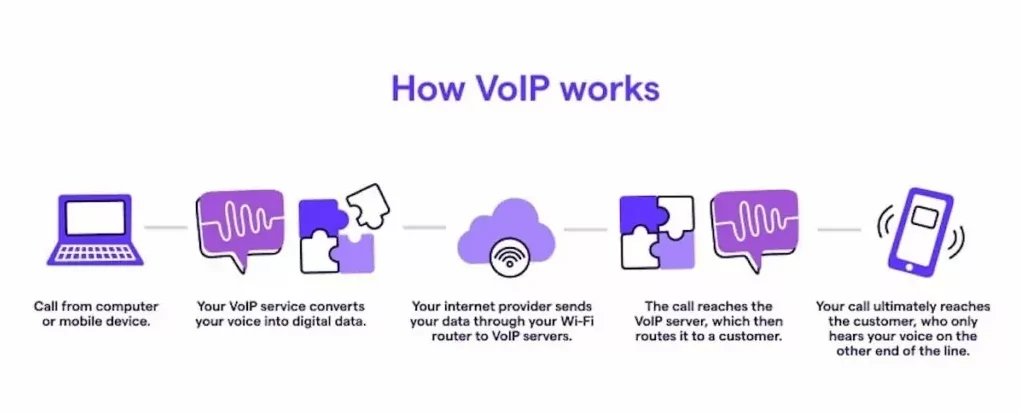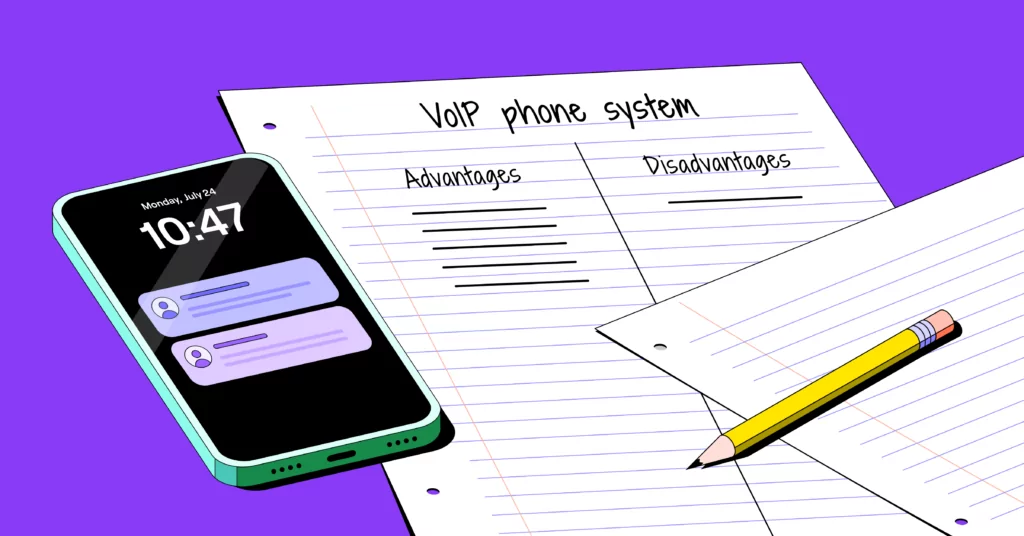The nature of work is changing, and being chained to a desk phone is becoming less and less appealing. As more professionals and industries embrace flexible schedules, more businesses are ditching desk phones and personal cell phones in favor of VoIP technology.
Voice over Internet Protocol makes life simpler. With nothing but an app and an internet connection, each of your team members can make reliable phone calls from a device of their choice — all without giving out their personal number. The advantages of VoIP are hard to beat.
But even if the benefits of VoIP phone services are enormous, you still want to make an informed decision and know your options before you invest. This guide can help you weigh the advantages and disadvantages of VoIP so you can decide if switching to VoIP is the right choice for your business.
Pros and cons of VoIP
Here are the advantages and disadvantages of VoIP at a glance.
VoIP Advantages
- Cost savings
- Easy to scale
- High portability
- User-friendly interface
- Great audio quality with high-speed internet
- Useful features such as transcripts and group calls
- Larger presence
- Lower learning curve
- Increased security
- More context in conversations
VoIP Disadvantages
- Requires stable internet connection
- Jitter, latency, and dropped calls possible
- No emergency services
Keep reading as we’ll break down each of these pros and cons in further detail so you can determine whether or not a VoIP solution is a great fit for your situation.
Advantages of VoIP phone systems
Business VoIP systems have a lot of benefits over traditional phone systems, ranging from greater ease of use to lower costs. Here are 11 major advantages of VoIP to consider.
1. Direct savings back
Upfront savings
You don’t have to pay for installation or ongoing maintenance with VoIP phones. Instead, you pay a monthly fee and use existing devices to call and text your customers.
How much could a VoIP phone save you per year? Try nearly $3,000 within the first 12 months. Here’s a chart of setup and hardware costs you can expect to pay for the average on-premises PBX system:

*Using the Sangoma PBXact Appliance 25 for comparison
✞Using the Sangoma P320 4-Line Phone for comparison
✧ZipRecruiter estimates the national hourly wage average for PBX technicians to be $26/hour. We estimate the installation cost to be a full day’s worth of work (10 hours) plus a 50% markup since installing a PBX system is highly specialized.
Similar to the installation cost estimate, we estimated labor maintenance costs to be a full day’s worth of work (10 hours) plus a 50% markup since maintaining a PBX system is highly specialized.
✵Yearly costs are calculated by adding equipment maintenance costs for five desk phones, 1 PBX server, and two PBX technician visits, likely a conservative estimate.
Month-to-month costs
The best VoIP systems offer low-cost plans for the features needed to grow your business. Recurring monthly (or annual) subscription costs have transparent prices so you always know what to expect.
For example, OpenPhone plans start at $15 per user per month for a business phone app with one free local or toll-free virtual phone number per user. Each plan comes with on-demand call recording and voicemail transcriptions, although you can always upgrade to access more features whenever you’re ready.
Compared to hardware and desk phones, this is a much lower (and predictable) monthly cost.
Lower international calling costs
VoIP providers tend to offer significantly lower rates on long-distance calls. If you’re working with international clients or team members, this can save you from massive phone bills.
With OpenPhone, you can even make unlimited voice calls to the US and Canada when working abroad. All you need is an internet connection to chat with customers on the go.
2. Indirect cost savings
Savings by enabling remote work
Have you been looking for ways to take your business remote? A VoIP system can help. Virtual numbers support international team members wherever and however they choose to work.
First, you can see immediate cost savings from not renting a physical office. Everyone on your team can make calls from anywhere, so there’s no reason to pay for a coworking space.
Second, remote work offers better access to international talent. Many contractors outside the US offer more affordable hourly rates, which means you can scale your business without busting your budget. You can also have employees in different time zones so customers can access support around the clock.
Additional features without paying extra
VoIP systems come with many more features than your average smartphone, which means you can easily scale your business with the tools you need to succeed.
OpenPhone bundles multiple features into a single monthly rate. A few of our customer’s favorites include:
- Unlimited calling and messaging to US and Canadian numbers
- Shared numbers
- Voicemail transcripts
- Call recording
Now compare this list with legacy phone providers requiring an upgrade or add-on fee to access the same features. Platforms like Nextiva, for example, require an Enterprise plan to access essential features like call recordings and voicemail transcriptions.
Increased productivity
The more productive your team can be, the further your dollar can stretch. Plugging your VoIP system into automations, webhooks, and third-party tools can help you streamline repetitive tasks so your team can focus on what counts — building customer relationships and growing your business.
Just imagine how much more efficient you could be by routing calls through an IVR or instantly responding to missed calls and voicemails, even if you’re not around to pick up the phone.
All this and more is possible with OpenPhone — you can create phone menus, auto-replies, and custom Zaps to take repetitive work off your team’s plate.
3. More options to easily use your phone
A VoIP phone system lets you easily call and text customers from your computer, laptop, smartphone, or tablet. Since you don’t need to purchase third-party hardware, you can start making business calls from wherever you are.
Plus, VoIP phones separate personal calls from business ones so you can draw a line between your personal and professional life. By setting business hours, incoming business calls can go straight to voicemail when you’re not working.
4. Increased mobility
When you’re working on the go, you can’t take your desk phone with you. Traditional phone lines rely on hardware stored in your office, so when you walk out the door, you may not know if you miss a call.
A key benefit of VoIP and softphones is their mobility. You can manage calls from whatever internet-enabled device is most convenient for you. Working from your office? Manage calls from your desktop or browser. Walking through a park? Pull out your mobile phone and tap on your app. Flying in an airplane? As long as you have the internet, you can make it work.
Many business VoIP providers have mobile apps designed to ring your business number on your phone. This means you get all the convenience of using your cell phone without having to share your personal phone number.
And keep in mind some VoIP providers do offer compatibility with desk phones, so the option’s still open if you want it.
5. Easy to scale
Wouldn’t it be nice to add new team members to your phone system without having to wait for IT to order and install new equipment? With a VoIP service, adding a new team member is as simple as inviting them via email and paying a little extra each month. OpenPhone gives you the option to assign each new employee a brand-new phone number or a shared phone number.

If you choose to create a new number, you can select from a wide range of US and Canadian numbers (as well as toll-free numbers). This way, you can:
- Expand your business to Canada from the US, and vice versa
- Establish a presence in multiple large cities by having a local number
- Give callers across the North American numbering plan a phone number they can reach without paying long distance fees if you have a toll-free number
You’re also never boxed into a certain amount of features with VoIP solutions. Want to add new features? Just upgrade your plan when you’re ready for call transcriptions, analytics, and more. Need to remove some team members from your plan? With OpenPhone, you can do this right from your dashboard.
This flexibility can prevent you from overpaying for unused phone lines or features you don’t need yet.
6. Give your team a larger presence
The larger your business appears to customers, the more likely they will see you as established and professional. With VoIP systems, you can use phone menus, toll-free numbers, and other features to make your team appear larger than it actually is.
Let’s say you’re located in New York City and want to connect with customers in Canada. With OpenPhone, you can purchase local Canadian numbers (without having an office there) so you can help your company feel more familiar to the community you serve.
7. More ways to strengthen your business
You’re not missing anything by ditching traditional phone hardware. Many VoIP service providers offer all the key features of a desk phone — and much more. On top of features like voicemail, caller ID, call routing, and call forwarding, which are available on traditional landlines, VoIP services like OpenPhone let you:
- Make more informed decisions: Enhance coaching and staffing decisions with call recordings and analytics, including heat maps that show you when you’re getting the most calls and texts.
- Streamline business processes: Connect to the tools you already use through integrations with email, Slack, Zapier, and more.
- Create a stronger local presence: Build trust and increase the likelihood of clients picking up their phones with local phone numbers in the communities you serve.
- Stay on top of business relationships from anywhere: Stay informed about client and team needs from any device. The best providers even let you take VoIP calls and messages straight from their browser-based app. You can even VoIP text and host conference calls from most platforms.
Unlike landline phones, VoIP services help you streamline all your business processes and provide insights to help your team perform better.
8. Lower learning curve
Using a desk phone system often requires memorizing a list of codes to use the features you need. It’s not intuitive at all. Most of your team members won’t know off the top of their heads to dial *72, a phone number, and pound (#) to forward calls.
VoIP platforms have user-friendly interfaces that look like the built-in phone apps your team members are already using. For example, auto attendants make sending calls to a specific teammate a breeze. There’s a far smaller learning curve, which means you don’t need to spend much time (if any) training your team.
Plus, setting up your first VoIP number only takes minutes once you sign up for a free, seven-day trial with OpenPhone
9. Reliable voice quality
We’ve all experienced poor sound quality, lags, and dropped calls with our smartphones. There’s a reason why the phrase “Can you hear me now?” resonated with so many people in the 2000s (and still does today). Standard calls may drop when your signal isn’t strong, which is a major nuisance for customers and your team.
Today’s VoIP phones are some of the most reliable phones around. As long as you have a solid internet connection — whether you’re using WiFi, data, or broadband internet service — VoIP phones work with crystal-clear call quality.
VoIP call quality is already quite advanced, and engineers continue to make improvements over time. These include:
- VoIP QoS (Quality of Service) protocols: You can think of QoS as a traffic director for your VoIP data. Your QoS attendant directs traffic over your network to allocate the greatest amount of resources to the greatest type of traffic. This ensures callers receive a reliable and high-quality audio message from your team.
- HD voice: This is designed to transmit high and low-frequency sounds over a wideband signal. You can ensure clear audio for callers through a 5G, 4G LTE, or Bluetooth connection.
- Noise-canceling microphones: These allow you to speak clearly to customers without worrying about loud background noise. They are perfect for busy call centers or bustling coffee shops — wherever your voice may be competing with others.
- Advanced audio compression: Callers enjoy a higher sound quality, meaning it’s easier for them to hear your reps. This makes it easy for them to get the information they need, which leads to happier customers over time.
10. Increased security in VoIP
Cybersecurity threats are one of the biggest issues facing small businesses today. You need a phone system designed to stop problems before they begin — something VoIP systems are uniquely qualified to do.
VoIP providers use advanced security measures to protect against threats like social engineering, hacking, and denial-of-service attacks. A few of their most common security features include:
- Encryption: OpenPhone encrypts phone calls and texts with WebRTC technology and Transport Layer Security (TLS). This helps to ensure unauthorized recipients don’t receive your sensitive messages.
- Identity management: Most VoIP systems require you to verify your business identity so they can stop bad actors from engaging in phone fraud.
- SOC 2 compliance: Providers like OpenPhone monitor the security of your data and maintain audit logs of events and account changes so you can pinpoint potential problems in advance.
11. Give your team more context
When all your communication and business tools are in one place, your team can save time and get more context to build better relationships with customers.
VoIP systems such as OpenPhone integrate with tools like HubSpot, Salesforce, and Slack so you can manage customers with a 360-degree view.
You also have access to:
- CRM software: This helps you manage client relationships with sales and deal dashboards, analytics, and more. When you connect your phone system and CRM, you can automatically pull customer calls, texts, and messages into your CRM.
- Call transcription software: You can easily get full transcriptions of phone calls, so you don’t need to listen to entire recordings. You can also get AI transcriptions and summaries to create a list of potential follow-up points.
- Customer communication software (CCM): You want each customer to feel heard and valuable, which means you need CCM tools like contact properties and custom notes. With OpenPhone, you can access dozens of contact management tools directly on-platform or integrate with a third-party tool to connect your existing tech stack.
Disadvantages of VoIP phone systems
There aren’t many limitations with a phone that runs on the internet — but there are a few. While VoIP systems are always improving, there are four disadvantages of VoIP that may affect your business.
1. No offline functionality
If you’re somewhere with no internet or experience a power outage, your clients and team members may not be able to reach you right away.
Let’s look on the bright side: When you want to vacation in a remote destination, there won’t be any business calls ruining your peace and quiet. And even if you’re without service, VoIP systems can send callers to voicemail so you can call back when you have signal.
If you are on a call through WiFi and you need to step out of the office, depending on your provider, you can switch to your data plan without having to call back.
2. Strong internet connection required
The voice quality of your VoIP depends on your internet bandwidth. In general, you need at least 100 Kbps upload speed available on each device and a good connection with less than 70 ms ping and jitter. You can check these numbers using a tool like Bandwidth Place.
What are the best types of internet connection for VoIP? You have several options:
- Fiber Optic Internet
- Cable Internet
- DSL (Digital Subscriber Line)
- Fixed Wireless Internet
- Business-Grade Internet
- 5G Mobile Broadband Connection
Just keep in mind you shouldn’t use satellite internet unless there are no other options available. Because radio waves need to travel such long distances, satellite internet may offer lower bandwidth and be prone to latency (which creates delays during voice calls).
3. Potential for jitter
To help you make calls over the internet, your VoIP service breaks down your audio into small “data packets.” When you and your caller both receive clear messages — as is normally the case — that’s because these bits of data are assembled on time and in the right order. But when jitter occurs, some packets may be delayed, which can lead to choppy audio and other call quality issues.
The most common cause of jitter? A poor internet connection. VoIP solutions typically use less bandwidth than video conferencing services, but having a high-speed internet connection is still ideal to avoid this disadvantage of VoIP.
How to troubleshoot for jitter
Poor audio quality with a VoIP call usually indicates a problem with your internet connection.
You can troubleshoot for jitter and latency by:
- Checking your internet speed using a tool like Speedtest. VoIP calls require more bandwidth than sending emails or chatting, so be sure to contact your internet provider about increasing your bandwidth if you don’t have enough.
- Checking your router and Ethernet cables. You should replace old or bad cables to ensure a stable internet connection.
- Running tests to check your phone’s frequency. If your device operates at a higher frequency than 2.4GHz, you may need to switch to a different device.
- Performing software and hardware updates. The sooner you update your devices and VoIP platform, the quicker you can write them off as potential culprits.
- Restarting your device and resetting your router. Sometimes the simplest fixes can get the job done.
4. No built-in emergency services
Non-fixed VoIP phones aren’t tied to a physical location, which gives them the mobility many professionals need. But this can cause issues when calling 911 — there’s no way for emergency services to trace your location. If you have a physical address linked to your VoIP account but you’re working on the go, emergency workers may be dispatched to the wrong location.
The Federal Communications Commission (FCC) also notes that VoIP 911 calls are sometimes routed to an administrative phone line that isn’t properly staffed.
Thankfully, your team members can still use their standard cell phone services to call 911 when needed.
VoIP vs. traditional phone systems
VoIP works by routing your calls and texts through an internet connection. When you make a call, your phone system breaks your voice into tiny packets of data. The system reassembles your message once this data reaches the other side.
You can use your existing phone, computer, or tablet to make VoIP calls. You also don’t have to pay extra costs for installation or setup — just a set fee each month. If you need more features or want to connect with the rest of your tech stack, you can tap into your provider’s third-party integrations to automate parts of your business.

For comparison, traditional landline phones work by sending calls through fiber or copper wires. You need to plug analog desk phones into phone jacks to successfully make a call, and depending on the size of your business, acquire hardware such as handsets.
You can’t send texts or use other unified communication tools with traditional landlines (unless you purchase additional services or hardware) and you likely have to pay monthly fees on top of installation costs. Since you can’t use existing devices like your smartphone, you can’t take callers with you on the go. There’s also no way to connect with third-party integrations or connect your existing tech stack.
How to select the right VoIP provider
Not all VoIP services are created equal.
Before picking the right provider for your needs, be sure to weigh considerations such as:
- Reliability: You can’t afford downtime while trying to call and text your customers. The best VoIP platforms offer 99.99% uptime so you can rest easy knowing you can always pick up the phone.
- Pricing: The last thing you want as a growing business is to pay for a bare-bones VoIP. You may want to evaluate pricing plans to get the best bang for your buck without compromising on the features you need.
- Customer support: While rare, problems can happen with your VoIP system. You need to partner with a reputable provider offering customer service and troubleshooting support.
- Scalability: It should be easy to add or remove team members from your plan. It should also be easy to upgrade your plan and unlock new features as your business grows.
- Security: How safe is the provider’s VoIP platform? Do they have a history of leaks or data breaches? If you can’t get clarity on how the service secures its platform, you may want to look for an alternative.
Tap into the benefits of VoIP
The advantages of VoIP systems are hard to deny: more ways to save time, more data-backed decisions, and more mobility at a far lower cost. That’s a win-win-win in our books. VoIP phones can improve your business communication while keeping your wallet happy.
When you consider VoIP’s advantages and disadvantages — the latter of which may not even affect your business — the perks likely make the switch from traditional phones to internet phones an easy decision.
If you want to test all the benefits of VoIP phones before you commit, start your free trial of OpenPhone to see how powerful an internet-based system can be.
Some (but not all) VoIP providers offer video conferencing, which you usually have to pay for as an add-on. Some video call tools, such as Microsoft Teams, offer VoIP telephony, but keep in mind you usually have to pay extra for this service.
VoIP technology uses the internet to make and receive calls rather than a traditional landline. You can learn more by watching this video on what VoIP is.
Some VoIP phones plug into a router and connect to the service provider using an Ethernet connection. Other VoIP providers are cloud-based, come with a softphone app, and don’t require desk phones for your number to work.
